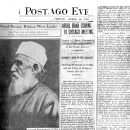Main menu
- ‘Abdu’l-Bahá’s Journey
- World Peace
- Stopping Racism in America
- Empowerment of Women
- More Principles...
- Prayer for America
‘Abdu’l-Bahá Coming to Chicago Meeting
Leader of Bahá’í Movement, Which Is Attracting Nations of the World, Is Guest in America
CHARITY AND PEACE SOUGHT
Universal Brotherhood of Man and the Unity of Religious Creeds Also Objects of Search.
‘Abdu’l-Bahá, which is not a name, but a title, signifying “servant of God,” the remarkable Persian who is at the head of the Bahá’í movement, which has spread to all corners of the world, and who arrived, in New York yesterday on his first visit to this country, will come to Chicago on April 27 to attend the international congress of the Bahá’í movement and Chicago adherents of the movement are making preparations for his reception. Delegates are expected from Honolulu and other parts of the globe, as well as from assemblies in various parts of the United States.
The congress will open on the evening of the arrival of ‘Abdu’l-Bahá with a reception to the leader and visiting delegates and will continue, according to present plans for five days. On the final day the woman’s Bahá’í assembly give a reception to the club women of Chicago in the red ballroom of the Hotel La Salle, and ‘Abdu’l-Bahá will address the women. In this connection it may be stated that he is in favor of woman suffrage, being an advocate of equality for women, not in politics only, but in all things else.
Teaches Brotherhood of Man.
The Bahá’í movement, although it originated in Persia nearly seventy years ago, was practically unknown in this country until the congress of religions during the Chicago world’s fair, when savants from the Orient told of the movement which was spreading among the polyglot races and creeds of their far eastern countries. The Bahá’í movement is not a sect, cult or creed, and its basic principles are the universal brotherhood of man, the unity of all religions and creeds, humanitarian, charitabel and hygienic reforms, tolerance and peace.
It seems a curious fact that the precepts of universal peace, arbitration, the equality of the sexes, anti-slavery and other great movements which have materialized since or are now commanding the attention of the world should have gained headway at so remote a period in the obscure and intolerant Moslem empires where religious and political freedom were unknown and where women were regarded as mere chattels. The awakening of China and the regeneration of Turkey are among the things which were foretold in the early teachings of the Bahá’í movement.
Founder Banished for Beliefs.
Bahá’ísm really was founded by Bahá’O’lla, the father of ‘Abdu’l-Bahá, whose advent was prophesied by “The Báb” — meaning the gate — a radical teacher, who suffered martyrdom for his faith. Bahá’O’lla — also a title meaning “glory of God” — was a man of noble family and in affluent circumstances, though of great spirituality and learning, who, as he said of himself, was “like other men who had been asleep on the couch of negligence” until “the divine inspiration entered his soul and took possession of him.” He laid no claim to being a prophet or the possessor of supernatural gifts. Had he been a man of less influence and less genius he would have suffered death for his teachings. As it was, he was exiled with his family to the penal colony at Acca, Syria, where he lived in his own house and had the freedom of the city.
There he remained until his death in 1892, with his son, who succeeded him as his pupil and disciple. The son also remained a prisoner in Acca for forty years, until two years ago, when the revolution in Turkey placed that nation on a civilized basis. But, in spite, of exile and virtual imprisonment, the doctrine of brotherhood and freedom spread and the Bahá’í movement has attracted the attention of some of the foremost thinkers in the world.
When ‘Abdu’l-Bahá was in London last year he addressed a vast audience in the Temple, presided over by the famous preacher, Dr. R.J. Campbell, and upon the invitation of Bishop Wilberforce addressed the congregation of the exclusive Westminster Abbey. He has appeared before bodies of scientific and religious masters, and his learning and profound declarations have evoked the greatest respect. Professor Brown of Cambridge after meeting ‘Abdu’l-Bahá wrote an exhaustive history of the Bahá’í movement and its teachings.
Historical Coincidences Recalled.
It was at the very hour of the prophecy by the “Báb,” on May 23, 1844, it is claimed, that ‘Abdu’l-Bahá was born, and also at the very hour when, on this continent, the first message was sent over a telegraph wire from Washington to Philadelphia. “Behold what God hath wrought.” No supernatural claim is made with regard to these circumstances by the adherents of the Bahá’í movement, but they are fond of relating the tradition as a coincidence.
One of the important subjects to be taken up at the congress in this city will be the project of establishing in Chicago a Bahá’í temple or “Mashrak-el-Azkar,” which literally means “the dawning place of prayer.” It is to be surrounded by hospitals, reading and rest rooms and other institutions, all free and open to the public, the entire group symbolizing the spiritual as well as the humanitarian service as taught by the adherents of the movement.
[picture caption: Noted Persian, Bahá’ían Move Leader
‘Abdu’l-Bahá, who will address followers in Chicago on peace and universal brotherhood]









